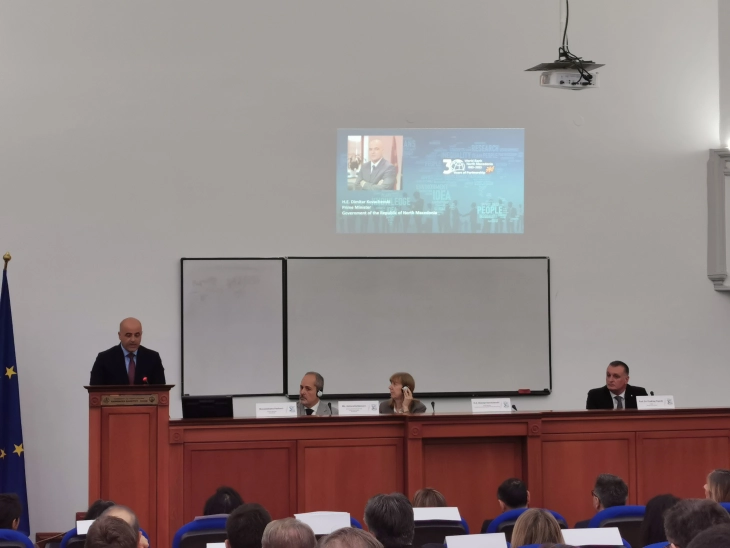World Bank support lays solid foundations for faster economic growth, facilitating country’s path to EU: PM
- The thirty years of support from the World Bank are laying solid foundations for the implementation of reforms that lead to faster economic growth and development, facilitating our path towards our goal – EU membership, said Prime Minister Dimitar Kovachevski at a conference Friday on 30 years of partnership with the World Bank.
- Post By Angel Dimoski
- 14:07, 1 December, 2023

Skopje, 1 December 2023 (MIA) – The thirty years of support from the World Bank are laying solid foundations for the implementation of reforms that lead to faster economic growth and development, facilitating our path towards our goal – EU membership, said Prime Minister Dimitar Kovachevski at a conference Friday on 30 years of partnership with the World Bank.
“This joint friendship, which includes the national institutions from the Government and the National Bank, represents an exceptionally important cooperation above all for our citizens, not only because of the financial assistance that we receive from the World Bank, but because of the transfer of knowledge and expertise, which are undoubtedly leading us towards the fulfillment of our strategic goals and values,” said Kovachevski.

The Prime Minister added that the World Bank has been a strategic partner to the country for 30 years, and has supported its development and progress through investment projects in various areas, worth almost US$3 billion.
“Our long-standing partnership with the Bank is reflected in the realization of numerous projects in road infrastructure, the construction of kindergartens and schools, facilitating trade and transport in the Western Balkans, connecting local roads, modernizing agriculture, promoting social services, promoting primary education – practically all areas of our life,” said Kovachevski.
The World Bank’s Country Manager for Kosovo and North Macedonia, Massimiliano Paolucci, said that according to the World Bank’s latest economic diagnostics of the country, providing people with high-quality and relevant skills; removing barriers for participation in the labor market, especially for women and young people; and improving access to quality public services for vulnerable categories and rural areas, should remain as priorities for the country.

According to the World Bank’s Vice-President for Europe and Central Asia, Antonella Bassani, the country has created a stable environment and attracted private investments, partially advancing exports in the manufacturing sector.
“The World Bank’s first project for North Macedonia, worth US$ 80 million, was approved in 1994 to support the program for economic reforms in the country. At that time, the annual inflation rate in the country exceeded 200 percent, and North Macedonia was on the brink of economic collapse and uncontrolled social pressures. Since then, after three decades of transition, North Macedonia has experienced the most stable economic growth in the Western Balkans,” stressed Bassani.

At the event, Finance Minister Fatmir Besimi and Minister of Labor and Social Policy, Jovanka Trenchevska, addressed a panel discussion focused on the aging population and migration as the two demographic challenges faced by North Macedonia.
Minister Besimi said migration and the reduced birth rate over the last 20 years are contributing to a serious decline in human capital. He stressed that these are serious challenges that cannot be changed overnight.
According to Minister Trenchevska, migration has serious implications for the growth and productivity because as the population ages, a shortage of qualified workforce emerges. She said the Ministry is actively working to prevent the negative consequences of the trends of migration through its Strategy on demographics.
Photo: MIA







